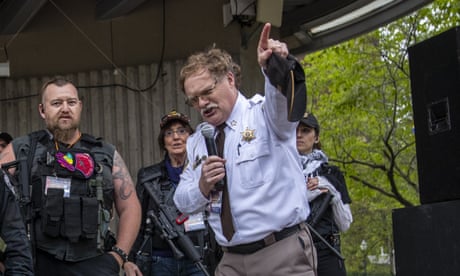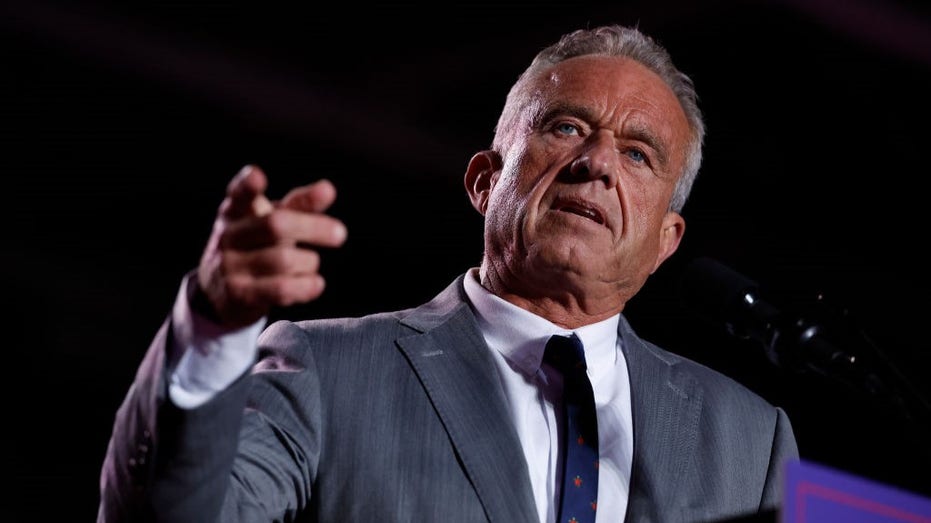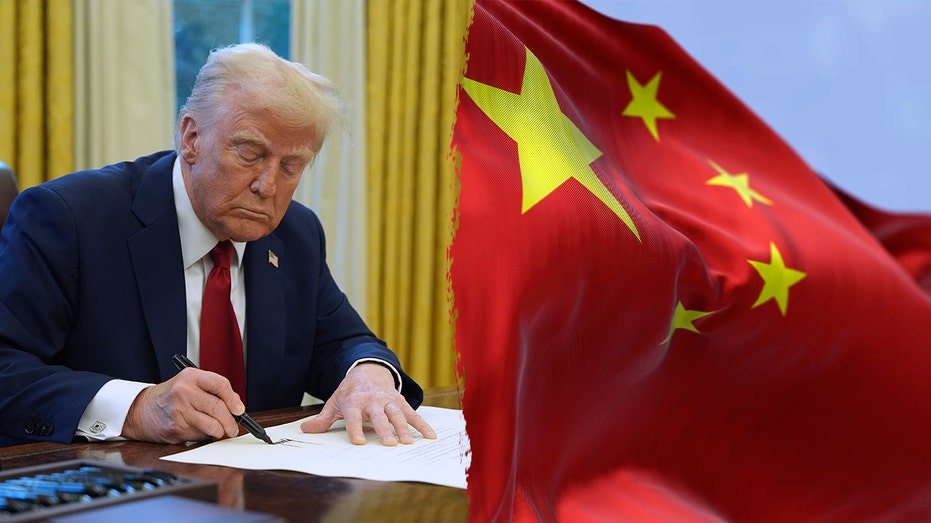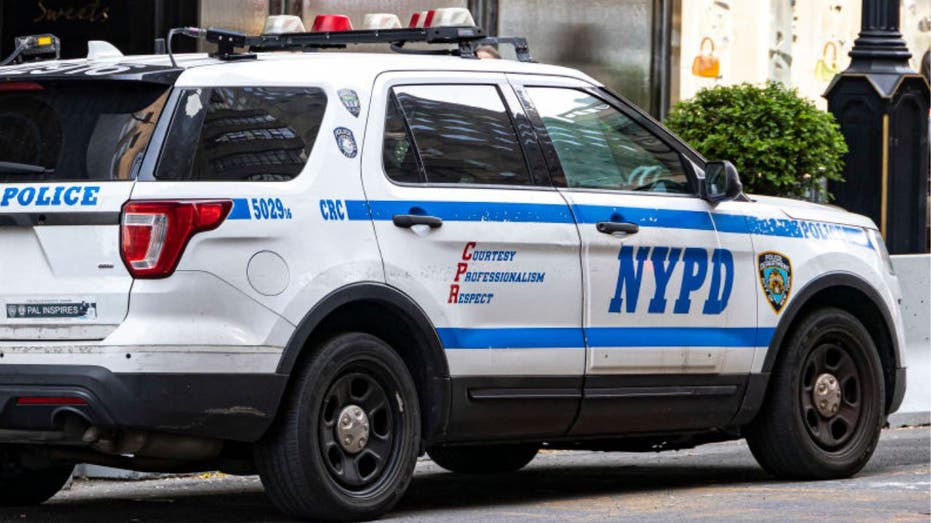- by foxnews
- 08 Apr 2025
Dar Leaf, Michigan’s ‘constitutional’ pro-militia sheriff, vies for re-election
Dar Leaf, Michigan’s ‘constitutional’ pro-militia sheriff, vies for re-election
- by theguardian
- 03 Aug 2024
- in politics

This article was produced as a collaboration between Bolts and the Guardian.
On a sunny afternoon in July, a crowd of roughly 100 gathered to listen to their local sheriff campaign for re-election in south-western Michigan. A self-described "constitutional sheriff" with longstanding ties to militia groups, Dar Leaf has made a national name for himself in far-right circles with his fruitless investigation to uncover evidence for Donald Trump's lies that the 2020 election was stolen.
But that wasn't what he wanted to discuss at his rally. Having come under intense scrutiny in the last three years for his election investigation and militia affiliations, Leaf spoke to his supporters about his office's more mundane work - upgraded vehicles and new training - and urged them to ignore the attacks he's faced.
"Our eyes are forward, that's why God put 'em in front of our head," he said to laughter and applause. "We've got to keep moving towards that finish line."
Still, it's his relentless effort to uncover voter fraud and his associations with far-right groups that have come to define him as he seeks to defeat three rivals in next week's Republican primary.
Taking up Trump's unfounded grievances, Leaf sent deputies to interrogate local election officials and tried to seize voting machines, which he claimed flipped votes from Trump to Joe Biden. His activities fit in a broader network of far-right sheriffs who responded to Trump's lies by wanting to police elections, and who may soon double down if the former president challenges the results of November's elections.
Leaf's skepticism about elections and convictions about the excesses of the federal government fit in comfortably in Barry county, a deeply red and rural county just north of Kalamazoo that voted for Trump over Biden in 2020 by a two to-one margin.
But locally, some Republicans want to turn the page. Two of his intra-party challengers in the 6 August primary have highlighted his investigation into the 2020 election as a key point of contrast.
"The sheriff has propagated these lies," says Joel Ibbotson, one of his three opponents. "I'm sick of that. I want it to end."
When Trump falsely alleged a Democratic party plot to steal the 2020 election through widespread voter fraud, he found a sympathetic audience in Barry county and its sheriff.
With the guidance of Stefanie Lambert, an election-denying lawyer who now faces felony charges for allegedly improperly breaching Michigan voting machines, Leaf launched an investigation into how the election unfolded in his county. He sent deputies to question local elections clerks, who saw his hunt as a form of intimidation. He repeatedly requested authorization to seize voting machines, but was denied by federal and state courts.
Throughout the investigation, Leaf presented no evidence of irregularities, let alone of a plot to steal the election. He maintains that the investigation is ongoing, and said that he couldn't elaborate on its status.
Scott Price, a local pastor who supports Leaf's re-election campaign, said Leaf was giving voice to widespread concerns about election integrity. "We're grateful that we have somebody that has the courage and literally is willing to stand and take the heat for something that other people are saying didn't even happen," said Price.
But some within Leaf's own party resisted the investigation.
Julie Nakfoor Pratt, the county's Republican prosecutor, rejected Leaf's inquiry into the 2020 election and denounced it as a waste of resources. In a lengthy statement before the county board of supervisors on 25 October 2022, Nakfoor Pratt explained why she could not act on Leaf's allegations, pointing to the importance of probable cause and exhaustive detective work in prosecuting cases. She recounted her office's investigation into a grisly homicide case as an example of the kind of rigor necessary in investigative policing.
Without evidence, she said, a case couldn't be prosecuted. "I will not put my signature on something if it's not there," said Nakfoor Pratt.
When his office approached her with a search warrant for voting equipment, "there was no probable cause," Nakfoor Pratt said. "It wasn't insufficient: there was none."
Earlier this year, Lambert, the lawyer, shared troves of private documents that she claimed were signs of a conspiracy with Leaf. She had obtained them during discovery while representing Patrick Byrne, a Trump ally, in a defamation case brought by Dominion Voting Systems, which some conservatives have falsely accused of rigging the 2020 election. The documents show Serbian Dominion employees troubleshooting technical questions, but in a letter to US representative Jim Jordan, Leaf wrote that they revealed something more nefarious.
"Serbian employees planned and conspired with premeditation to delete United States election data," wrote Leaf, echoing a similar claim that Lambert made on the social media platform X.
Since long before the 2020 election, Leaf has been involved with the Constitutional Sheriffs and Peace Officers Association (CSPOA), an ultraconservative group that promotes the belief that sheriffs have the ultimate authority to interpret and enforce the constitution within their county. This philosophy came into focus for him during the Covid-19 pandemic when, angered by lockdown orders intended to mitigate the spread of the virus, Leaf refused to enforce social distancing rules.
In an interview, Leaf said he first learned about the constitutional sheriffs in 2010, when Richard Mack, a former Arizona sheriff and the founder of CSPOA, reached out.
"I think they were just calling sheriffs up, especially new sheriffs," said Leaf, who was intrigued enough by their movement to attend a conference in Las Vegas. What he heard there, he said, "was a big wake-up call".
Most important, Leaf said, was what he learned about Printz v United States, a supreme court case brought by Mack and Jay Printz, a Montana sheriff who argued that a provision of a federal gun violence prevention bill that required law enforcement agencies to conduct background checks was unconstitutional. They won; the supreme court ruled that the federal government could not compel state agencies to enact such a measure.
"The case proved that local officials have the right, the power and the duty to stand against the far reaching inclusions by our own Federal Government," Mack later wrote in his book.
The ideas behind the constitutional sheriffs movement are shared by a startling number of sheriffs.
Still, actual membership in CSPOA appears low. One study, produced by the Howard Center for Investigative Journalism and the Arizona Center for Investigative Reporting, identified 69 sheriffs who publicly endorsed the CSPOA or claimed membership in the organization. A national CSPOA conference in Las Vegas this year drew about 100 attendees, among them January 6 defendants, conspiracy theorists and rightwing influencers - but few actual sheriffs.
Leaf was in Vegas, though, telling attendees excitedly: "I'm getting goose-bumpy here."
Since assuming the office of sheriff two decades ago, Leaf has developed a passionate following in Barry county.
"Dar is the most well-known person in the community," said Barry county resident Olivia Bennett, who described Leaf as a family friend. "You just can't get away from his name." Bennett's father served in Leaf's "posse", a word Leaf uses to describe a group of citizens who don't work for the sheriff's office but assist him in his duties.
"My dad would come home and say different things, like, 'If terrorists come, they're going to come from these small towns first,' and I just thought it was stuff my dad said," Bennett said. "When later, I heard Dar speaking about it, I realized, 'Oh no, my dad got these beliefs from Dar himself.'
"Dar really does make people feel scared and make it sound like he's the only one who can really protect you," Bennett added.
Leaf has long flexed his beliefs that sheriffs are guardians of order. "We're not here to intimidate people," he told local media in 2014. "This is still a badge, it's not a swastika. We have to prepare for the worst. We have to prepare for things you don't like talking about."
Since joining the CSPOA, Leaf has strived to introduce his community to the group's lofty ideas about sheriffs' unique role in upholding the constitution. Leaf hosts bi-monthly study groups focusing on Christian faith and common law and leads a course on militias, titled Awaken the Sleeping Militia Clause, promising attenders willing to pay the $175 entry fee that they'll "learn a militiaman's duty" and earn a certificate of completion.
In one meeting, whose recording Bolts and the Guardian reviewed, Leaf expounds on Michigan's new red flag law, which allows police to take firearms away from individuals who a judge has determined pose a threat to themselves or others. He describes it as illegitimate, implying that he had the authority to make that determination within his county.
"No, my people did not consent to that," said Leaf. "It's a jurisdictional thing."
During a separate meeting this spring, Leaf updated members on the CSPOA's April conference in Las Vegas. He said he was especially pleased to hear from Richard Fleming, a doctor who pleaded guilty in 2009 to felony charges of mail and healthcare fraud and has made a name of himself since then as a proponent of the unsubstantiated theory that Covid-19 was created as a bioweapon.
Fleming's claims, Leaf said, "are pretty much being ignored by the cabal that's trying to take over the world".
As Covid-19 spread across the country in March 2020, Leaf vowed to strike back against stay-at-home orders that he viewed as an example of governmental overreach.
During that period, Gretchen Whitmer, the Michigan governor, briefly prohibited the use of motor boats, permitting only kayaking and canoeing as a form of outdoor recreation. The order, which Whitmer later walked back, infuriated many residents of Barry county.
Leaf said he would not enforce the order. "The sheriff came out and said, 'I don't care if your boat has a motor on it or not. If you're getting in a heated argument with your wife, go on the lake and go fishing, if that's what it takes to cool off,'" said Ibbotson, who used to be an outspoken supporter of the sheriff and is now running as one of his primary challengers.
Leaf took part in a rally against Michigan's stay-at-home orders, and called them tantamount to an "unlawful arrest". Also at the event were members of a militia called the Wolverine Watchmen, a group that was later implicated in a plot to kidnap Whitmer.
When William and Michael Null, two brothers from Barry county who attended the event, were accused of taking part in the kidnapping plot, Leaf defended them. The group, he suggested, could have been planning to "arrest" the governor. "In Michigan, if it's a felony, you can make a felony arrest," he told a local news outlet. The Null brothers were later acquitted, during a trial that showcased how deeply involved FBI informants and agents had been in pushing the militia members' rhetoric toward a kidnapping plot.
When asked about the controversy and about concerns that he might be too closely connected to militias, Leaf smiled and looked a little bewildered.
"Of course," Leaf said. "There should be militias connected with every sheriff."
Leaf's growing embrace of far-right politics has ruffled residents, including some of his former supporters.
"When he had mentioned that the Null brothers were perhaps just trying to do a citizen's arrest on the governor, that was the final straw for me," said Ibbotson, who decided to challenge him in the Republican primary.
Ibbotson, who owns a logistics company, said he wanted the office to drop the election issue. Election administration, he said, should be in the hands of the county and township clerks.
"My goal through this, even if I lose, is to make it unpopular to talk about election integrity, in the sense that the sheriff has propagated these lies," said Ibbotson. "I'm sick of that. I want it to end." Ibbotson says he has hired formerly incarcerated drivers to work in his business in hopes of reducing recidivism.
Leaf's second challenger, Richelle Spencer, is a sergeant in the Barry county sheriff's office, who has worked as a narcotics detective and in the K9 unit, says she decided to run for sheriff despite her aversion to politics. She said that the unending election investigation and Leaf's involvement in the CSPOA has sowed divisions.
"Everybody is ready for something different in the sheriff's office - we're ready for some stability, I can tell you that," said Spencer.
"He goes away and does these speaking engagements and when he's doing that, he's not available to us," she added, "and he's not aware of what's going on in his own community."
Leaf's third challenger, Mark Noteboom, a deputy in the sheriff's office, has had a direct hand in Leaf's investigation. Noteboom declined to share specifics about the investigation, but told Bolts and the Guardian that he felt "the clerks in Barry county did absolutely nothing wrong. They did everything they were supposed to do, and they did it the right way." Noteboom added that as sheriff he would focus on improving conditions in the county jail and other local issues.
"You're the sheriff of Barry county, not the sheriff of the United States," he added.
At the CSPOA event in March, Leaf addressed the gathering on the topic of his investigation in Barry county and the status of election integrity nationwide. His police work, Leaf said, had been hampered by Dana Nessel, attorney general of Michigan and a Democrat who has been investigating Lambert and others for allegedly improperly seizing and tampering with voting machines. Deputies in his office didn't want to touch the case.
"That was the first major stumbling block," said Leaf. Local crime had also pulled him away from the investigation. "We had a missing person and we took quite a while, a lot of manpower, to go find. I had to put my light-duty deputy off to go find this missing person."
There were so many leads, the investigation had become so expansive, and the end wasn't even in sight more than two years after Leaf initiated the investigation. Still, he said, he had not given up. It was on him and other sympathetic minds to keep up with the search.
"Keep chuggin'," he advised the room. "Keep charging the castle!"
- by foxnews
- descember 09, 2016
Ancient settlement reveals remains of 1,800-year-old dog, baffling experts: 'Preserved quite well'
Archaeologists have recently unearthed the remarkably well-preserved remains of a dog from ancient Rome, shedding light on the widespread practice of ritual sacrifice in antiquity.
read more





